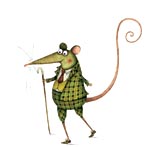The countryside is soggy
After a winter drowning in rain, the countryside is just starting to recover


The countryside feels dank and mouldy. Stains of brown sludge pockmark the fields where, for weeks, ephemeral ponds had appeared after the endless rains. Moss is everywhere. Many fields are under the plough as the farmers race to replace drowned winter crops, and vast flocks of gulls follow the tractors snapping at earthworms as they're unexpectedly gouged into daylight.
* Subscribe to Country Life and save £51
The plough constantly scrapes and smashes against the flints that lie thickly strewn over and under the earth. Most of the glassy, grey-blue flints are the size of a man's fist, but some of these fossilised sponges are as big as a car's tyre. This is not a place for the plough and arable farming, but that's where the money is today. The cheap horsemeat, illegally sold, is another wound to the struggling livestock farmers. The plough is conquering the countryside even if the flints fight it.
Today, sponges grow under Apollo's golden sun in the Aegean, but, once, Hampshire had a similar climate. But even now, we have our own small glisters of gold-primroses are glowing in the hazel woods and the unheralded lesser celandine clads the banks in yellow. Despite the gloom, spring is about to be unleashed.
* Follow Country Life magazine on Twitter
Sign up for the Country Life Newsletter
Exquisite houses, the beauty of Nature, and how to get the most from your life, straight to your inbox.
Country Life is unlike any other magazine: the only glossy weekly on the newsstand and the only magazine that has been guest-edited by HRH The King not once, but twice. It is a celebration of modern rural life and all its diverse joys and pleasures — that was first published in Queen Victoria's Diamond Jubilee year. Our eclectic mixture of witty and informative content — from the most up-to-date property news and commentary and a coveted glimpse inside some of the UK's best houses and gardens, to gardening, the arts and interior design, written by experts in their field — still cannot be found in print or online, anywhere else.
-
 Helicopters, fridges and Gianni Agnelli: How the humble Fiat Panda became a desirable, design classic
Helicopters, fridges and Gianni Agnelli: How the humble Fiat Panda became a desirable, design classicGianni Agnelli's Fiat Panda 4x4 Trekking is currently for sale with RM Sotheby's.
By Simon Mills
-
 What's a 'wellness village' and will it tempt you back into the office?
What's a 'wellness village' and will it tempt you back into the office?The team behind London's first mixed-use ‘wellness village’ says it has the magic formula for tempting workers back into offices.
By Annunciata Elwes